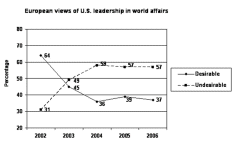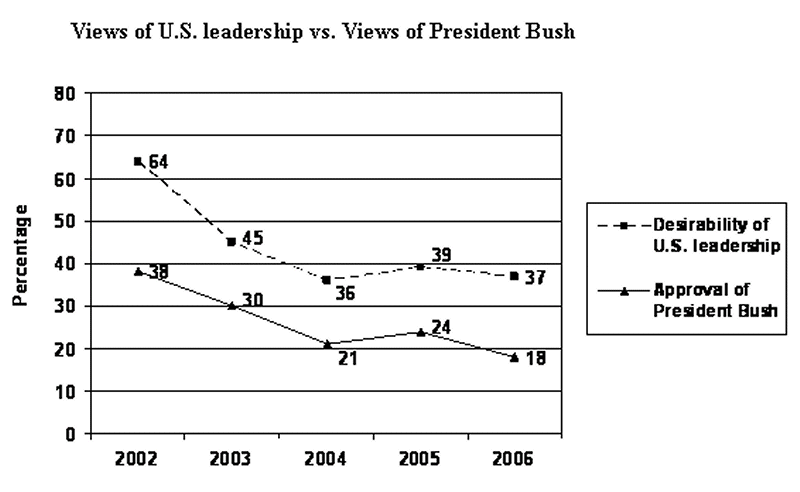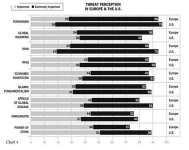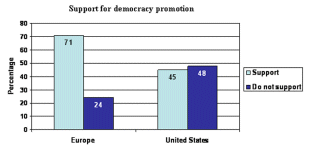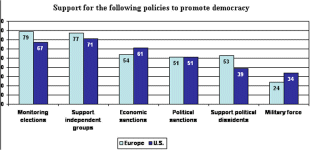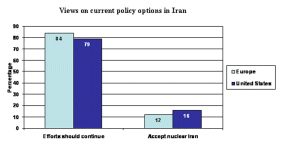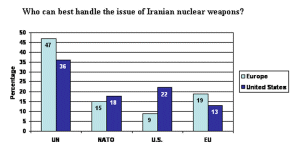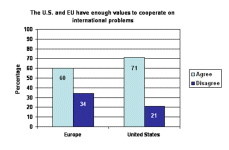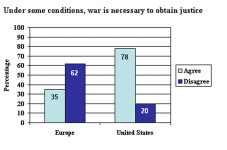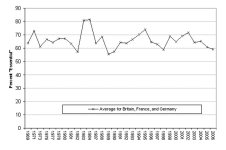TESTIMONY FOR JOHN K. GLENN
DIRECTOR OF FOREIGN POLICY
GERMAN MARSHALL FUND OF THE UNITED STATES
U.S. HOUSE OF REPRESENTATIVES
HOUSE COMMITTEE ON FOREIGN AFFAIRS
SUBCOMMITTEE ON INTERNATIONAL ORGANIZATIONS, HUMAN RIGHTS, AND OVERSIGHT
Thursday, March 23, 2007
Mr. Chairman, members of the Committee, thank you for your invitation to speak with you today. Let me begin with a brief summary. Public opinion data shows that, five and a half years since September 11, 2001 the image of the United States in the world has not recovered from its steep decline after the war in Iraq. Public debate on both sides of the Atlantic has wrestled with allegations of secret CIA prisons in Europe, continued violence in Iraq, and concerns about human rights in the U.S. detention center in Guantanamo Gay, Cuba. Yet at the official level there have been efforts at rapprochement, shifting the policy agenda toward global threats and concerns on which the transatlantic divide may not be as great. Public opinion can provide valuable insight into how and why Americans and Europeans may see the world differently, as well as the reservoir of support for particular policy options. At the same time, it cannot recommend particular courses of action, nor can it predict the future. I hope that you will find this data useful to you in your debates about current U.S. policies and look forward to our discussion.
Transatlantic Trends is an annual survey by the German Marshall Fund of the United States, a nonpartisan American public policy and grantmaking institution dedicated to promoting greater cooperation and understanding between the United States and Europe, and the Compagnia di San Paolo, with additional support from the Fundação Luso-Americana, Fundación BBVA, and the Tipping Point Foundation. The survey is based on a representative sample of public opinion of 1,000 people in the United States and twelve European countries: Bulgaria, France, Germany, Italy, the Netherlands, Poland, Portugal, Romania, Slovakia, Spain, Turkey, and the United Kingdom. The most recent, the fifth annual survey was conducted on June 6-24, 2006.
The polling is conducted by a professional survey research firm, TNS Opinion, to conduct the survey using Computer Assisted Telephone interviews in all countries except Bulgaria, Poland, Slovakia, Romania, and Turkey, where lower telephone penetration necessitated the use of face-to-face interviews. For results based on the national samples in each of the 13 countries surveyed, one can say with a 95% confidence that the margin of error attributable to sampling and other random effects is plus or minus three percentage points. For results based on the total European sample, the margin of error is plus or minus one percentage point. Europe-wide figures are weighted on the basis of the size of the adult population in each country.
Persistent decline in European views of the United States since 2002
Since 2002, we have tracked attitudes toward U.S. global leadership and have observed a dramatic reversal in European attitudes. The proportions of Europeans who view U.S. leadership in world affairs as desirable has reversed since 2002, from 64% positive to 37% this year, and from 31% negative to 57%. Chart 1 below indicates that European positive attitudes toward U.S. global leadership fell to this level in 2004 and have remained virtually unchanged over the past three years.
Among European countries, the greatest decline was in Germany, from 68% positive in 2002 to 43% in 2006. Only three European countries currently view U.S. leadership more positively than negatively: the Netherlands (51% to 44%), Romania (47% to 35%), and the United Kingdom (48% to 45%).
In 2005, we asked Europeans if they felt relations had changed after the President's diplomatic efforts to mend relations in his second term. Secretary of State Condoleezza Rice visited Paris in February 2005 in an effort to change the tone and improve relations with Europe, and President Bush traveled to Europe three times in the first six months of his second term. He became the first American President to officially visit the European Union, declaring in Brussels, "The alliance of Europe and North America is the main pillar of our security." Yet, Europeans appear to have been unmoved by these efforts. Asked in June 2005, 52% of Europeans said that relations had stayed the same. Americans agreed, with 50% saying relations had stayed the same.
Is this anti-Americanism?
There were those in Europe who suggested that the re-election of President Bush in 2004 would transform what had previously been anti-Bush feelings linked to the war in Iraq into anti-Americanism. I know that this Committee has heard testimony from Andrew Kohut at the Pew Research Center, and although I admire his work, I'd like respectfully disagree with his view that we are seeing a new anti-Americanism. The trend data in Transatlantic Trends suggests that what we are seeing is not anti-Americanism, per se, so much as strong disagreement with what America is doing in the world today. Anti-Americanism, if we take the concept seriously, should refer to something broader and presumably more enduring than attitudes or views toward particular U.S. policies, more similar to other forms of prejudice such as anti-Semitism and racism.
We have observed however that Europeans continue to distinguish between their views of President Bush and their views of the United States more generally. While European attitudes toward President Bush's handling of international affairs have fallen from 38% positive in 2002 to 18% in 2006, there is a 19-point gap between this figure and their evaluation of U.S. leadership in world affairs.
You'll notice that his gap has generally persisted over five years, and thus the data suggests that European views of President Bush have not become generalized into views of the United States broadly or become a new form of anti-Americanism. To be clear, views of the United States are certainly driven by views of the policies of its president, but they are not identical.
Europeans views of U.S. policies in Iraq and in the world
It has been widely observed that Europeans viewed the U.S. decision to go to war in Iraq negatively. This is supported by our own data as well. Asked in 2004, 80% of Europeans felt that the war in Iraq was not worth the loss of life and other costs of attacking Iraq. 73% of Europeans felt that the war in Iraq increased the threat of terrorism around the world. There is little reason to believe that those numbers have become more positive. Yet, it is worth asking, how do Europeans see U.S. policies beyond the war in Iraq? I'd like to briefly review European attitudes in three areas: threat perception, democracy promotion, and Iran.
Threat Perception: We have asked every year how Americans and Europeans view likely threats over the next ten years, and we have found that American and European threat perception is similar, perhaps surprisingly so given widespread debate about our differences. Large majorities - topping 70% of Americans and Europeans - continue to agree on the importance of a wide range of international threats in the next 10 years, including international terrorism, Islamic fundamentalism, immigration, the global spread of disease such as avian flu, global warming, and the growing power of China.
The greatest threat for both Americans and Europeans is international terrorism, with 97% of Americans and 94% of Europeans seeing it as an important or extremely important threat. The largest shifts in threat perceptions since last year were increases on both sides of the Atlantic in those who see Islamic fundamentalism as an "extremely important" threat (+13 percentage-points of Americans, +11 percentage-points of Europeans).
Democracy Promotion: At the rhetorical level, the United States and the European Union have identified democracy promotion as a strategic priority for transatlantic cooperation. The two partners have recently cooperated closely in the Western Balkans on the final status of Kosovo, the contested presidential election in Belarus, and efforts to relieve suffering in Sudan. Yet developments in the Middle East such as the elections of a Hamas-led government in Palestine and a government in Lebanon including Hezbollah have raised new challenges for democracy promotion.
Strikingly, our data suggests that more Europeans than Americans support promoting democracy. We asked Europeans if it should be the role of the European Union to help establish democracy in other countries and Americans if it should be the role of the United States and, remarkably, more Europeans than Americans support the goal of democracy promotion. 71% of Europeans agreed, compared with 45% percent of Americans in 2006.
Now you might say, perhaps we mean different things by "democracy promotion," but our data suggests otherwise. Asked whether they would support one or more policy options to promote democracy, Americans and Europeans show strong support for less intrusive options such as monitoring elections (79% of Europeans, 67% of Americans) and supporting independent groups such as trade unions, human rights associations, and religious groups (77% of Europeans, 71% of Americans). Support declined when asked about more intrusive or severe options, such as economic sanctions, supporting political dissidents, political sanctions, and use of military force which received the lowest support among Americans (34%) and Europeans (24%).
Iran: We asked Americans and Europeans about policy options in Iran, seen by some as the most prominent example of recent greater transatlantic consultation. The United States and the European Union (led by France, Germany, and the United Kingdom) have sought to coordinate their policies to prevent Iran from acquiring nuclear weapons and to bring Iran to the United Nations Security Council. 79% of Americans and 84% Europeans agree that efforts by the United States and the European Union to prevent Iran from acquiring nuclear weapons should continue, with only 12% of Europeans and 16% of Americans who feel we should simply accept a nuclear Iran.
When asked who can best handle the issue of Iran acquiring nuclear weapons, the largest percentage of Europeans (47%) and Americans (36%) agree on the United Nations.
Do Americans and Europeans have different values?
Some argue that differences in values explain European attitudes toward the United States: Americans are different and Europeans dislike us for those differences. The arguments usually suggest that we are too religious, while they are secular; we believe in military force, while they believe in negotiation; we are individualistic, while European are seen as collectively-minded; and we believe in risk and the free market, while they believe in security and the welfare state. While there are doubtless very real differences across the Atlantic, in my personal opinion, differences among European countries, as well as differences among different parts of the United States, are likely to be as significant. The issue, from a foreign policy perspective, is can we work together?
We asked Europeans and Americans in 2004, one year after the war in Iraq, if they felt that the United States and European Union have enough common values to be able to cooperate on international problems. 60% of Europeans and 71% of Americans felt that we do share enough common values.
On the question of cooperation, 82% of Europeans and 91% of Americans agreed in 2006 that, when our country acts on a national security issue, it is critical that we do so together with our closest allies. Yet, let me provide data that highlights the real challenge for transatlantic cooperation, the use of force in international affairs.
Use of force and legitimacy: We asked Europeans and Americans, would you agree or disagree with the following statement: "under some conditions, war is necessary to obtain justice." Remarkably, 78% of Americans agreed with this statement, compared with 35% of Europeans.
These different views on the use of force have led some to speculate that Americans are from Mars and Europeans are from Venus, but even the author of this turn of phrase, Robert Kagan in the afterward to the paperback edition of "Of Paradise and Power" concedes that the one thing he underestimated was the power of legitimacy. For many Europeans, the matter of legitimacy is a question not only of what the United States does, but how it does it. The role of the United Nations is often invoked in this debate. Our data in Transatlantic Trends shows that majorities on both sides of the Atlantic (61% of Americans and 71% of Europeans) view the UN favorably. We differ however on the necessity of the United Nations in providing legitimacy to military force. When asked if it is justified by bypass the United Nations when the vital interests of their country are involved, 59% of Americans agreed, compared with 44% of Europeans in 2004.
How different are current trends from the past?
The data presented here on European attitudes toward U.S. policies are well-served by taking a historical perspective. We know that views of the United States have fluctuated over time and might remember, for example, critical attitudes toward the United States during the war in Vietnam. While there have been deep drops, there have been recoveries. Is the current situation different? Admittedly, this question can only be partially answered by public opinion polls that cannot explain why change takes place.
While the first Transatlantic Trends survey was conducted in 2002, there is considerable longitudinal public opinion data that provides insight. European attitudes toward NATO are often taken as indicators of the transatlantic relationship in general, and our survey's question on NATO reflects the current decline in European attitudes, with a drop from 69% of Europeans who feel that NATO is essential to their country's security in 2002 to 55% in 2006. The chart below places that question in historical perspective for four countries (Germany, France, Italy, and the United Kingdom), using data from Professor Richard Eichenberg of Tufts University, who also works with us on Transatlantic Trends.
Is NATO still essential?
This chart shows that European attitudes toward NATO dropped around the Pershing missile crisis in 1981, the end of the cold war in 1989, and the wars in the Balkans in the mid-1990s. But in each case, European attitudes rebounded, and they may do so again.
A gap between elites and the general public?
In conclusion, I'd like to offer a few personal thoughts on the future of European attitudes toward the United States. In the transatlantic policy world, one has the sense that anti-US feelings in Europe have largely played themselves out. The European Union Representative for Common Security and Foreign Policy, Javier Solana, said last year, "the situation, as far as, our bilateral relationships, is almost perfect. What have to begin to think is how to resolve together the many problems, which are an international agenda, so no more talking about problems between us." European Commission President Jose Manuel Barroso observed, "EU-U.S. relations have strengthened considerably over the last year and we are working together systematically to address common economic, political, and environmental challenges." A recent survey of members of the European Parliament and European Commission, using the same questionnaire as Transatlantic Trends, found that European elites support U.S. global leadership much more strongly than the general public.[1]
The public opinion data presented here suggests there remains a gap between elite level improvement in relations at the working level and the general public. This gap may simply reflect a time lag in the perception of change, especially if political leaders continue to declare their desire to leave behind the bitterness around Iraq. On the other hand, the persistence of negative views of President Bush among Europeans may indicate that their minds are made up, that change will only be possible with a new president after 2008. Public opinion is notably only one of many factors shaping foreign policy, a factor that is influential under some conditions, such as elections. We should look closely to coming European elections in France and Turkey, as well as the anticipated change in leadership in the United Kingdom. The new leadership in Europe will be decisive in determining the future of European attitudes toward the United States and the potential for transatlantic cooperation.
[1] See European Elite Survey, www.affairiinternazationali.it for the full data and analysis.
|
NEWSLETTER
|
| Join the GlobalSecurity.org mailing list |
|
|
|


